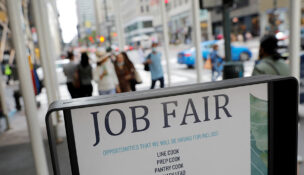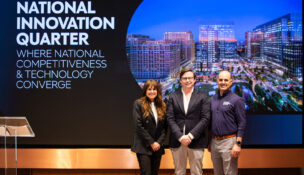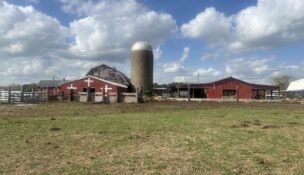Taking aim at ‘patent trolls’
Critics worry new law may hurt the people it was designed to protect
Tim Loughran //August 28, 2014//
Taking aim at ‘patent trolls’
Critics worry new law may hurt the people it was designed to protect
Tim Loughran //August 28, 2014//
Republican state Sen. Richard H. Stuart of Montross says legislation he introduced at the request of Northern Virginia technology companies is designed to end what he calls a “shakedown.”
Many Virginia businesses had received vaguely worded “demand letters” from companies claiming infringement on patents they owned.
The authors of these “bad faith” letters, frequently derided as “patent trolls,” usually demand swift payment of overdue royalties and licensing fees, implying that any failure to comply may result in more expensive legal sanctions through the courts.
Industry groups across the commonwealth report that rather than throwing these letters away — or spending the initial time and money to investigate the claims — many (but not all) of their members opt to write checks to the complaining company rather than risk spending more money in protracted litigation.
“We don’t want to injure anybody’s ability to protect their patents. That’s not what this is about,” says Stuart. “But we do want to stop what I like to call ‘legal extortion,’ and there were a lot of businesses suffering from that.”
Stuart saw his bill (combined with an almost identical bill sponsored by Del. Israel D. O’Quinn of Bristol) signed into law July 2 after being passed unanimously by both the Virginia Senate and House of Delegates.
Virginia’s new law requires, among other things, that any correspondence claiming patent infringement must include:
- the patent’s number,
- the names of the patent holder and anyone assigned licensing rights to that patent and
- a detailed description about how the alleged offender is violating the patent.
The law’s “bad-faith” standard also will be triggered if the patent infringement allegation includes any demonstrably false statements, demands unreasonable licensing fees or reasserts an infringement claim that a court previously deemed baseless.
Following the lead of Vermont last year, Virginia is among more than two dozen states that have either introduced or passed legislation aimed at curbing a recent rise in nuisance patent infringement letters. (see graphic) Similar federal legislation, including a bill sponsored by Virginia Rep. Bob Goodlatte (R-6th District), remains stalled on Capitol Hill.
“Our office worked closely with legislators to craft a bill that we believe will protect Virginia businesses from expensive and unnecessary litigation and legal fees that are generated by patent trolls,” Attorney General Mark Herring said in a statement explaining his support for the law.
“We feel confident we have a law that offers Virginia businesses real protections from truly bad-faith assertions, while strengthening the patent system as a whole by protecting the rights of holders of legitimate, strong patents and owners of intellectual property to bring genuine claims,” he said. “Our office already has a robust consumer protection division to help protect individuals from abusive and illegal business practices, so this is, in many ways, an extension of those efforts.”
To help the attorney general’s office enforce the law, the General Assembly budgeted $143,179 annually for the next two years. The money will be used to hire additional staff to work with Virginia companies that suspect they are being targeted improperly, says Michael Kelly, the attorney general’s director of communications.
“We will engage in continual outreach to Virginia businesses to apprise them of our intake, investigation and enforcement procedures for bad-faith claims of patent infringement,” says Kelly.
“If a business believes they have received a demand letter that was issued in bad faith, and which meets the statutory criteria for a bad-faith claim, we want them to contact us so we can investigate,” he says. “It will be up to commonwealth’s attorneys to determine how they would like to use the new law, but we will be happy to work with them throughout that process.”
The law is supported by companies and industry associations that, in close consultations with lawmakers, helped craft the legislation’s final language. Those include AOL, Micron Technologies, the Virginia Bankers Association, the Virginia Society of CPAs, Virginia Biotechnology Association, the Northern Virginia Technology Council, the Fairfax County Chamber of Commerce, the Virginia Chamber of Commerce and the Virginia Retail Federation.
Nonetheless, the law has its critics. Erich Spangenberg, the owner of IPNav, an international intellectual property licensing and consulting company based in Dallas, says Virginia’s intent to reduce companies’ litigation costs in patent-licensing matters may backfire.
“The barrage of legislation at the state level may help slow down ‘bad-faith demand letters’ from companies that are actually acting in bad faith. But it will also generate more litigation and less negotiation from patent owners who are acting in good faith, but who are not willing to give the opening advantage to a company infringing their patent,” he says, referencing a blog post from March on his company’s website.
In particular, he argues that the extensive technological and production information requirements in Virginia’s law could put genuine patent holders at an early legal disadvantage — outside the protection of the courtroom — compared with companies that may have stolen patents.
“The safest course of action, therefore, is not to send letters at all — but just go straight to filing a lawsuit,” says Spangenberg. “We wonder if Virginia’s high-tech industry will be cheering the new legislation so much when they find out that the logical response from patent owners will be ‘sue first, discuss later.’ ”
Kristen Osenga, an intellectual property expert at the University of Richmond School of Law, agrees with Spangenberg’s concerns, saying it is often impossible until after a patent dispute arrives in a courtroom to know for certain whether infringement has occurred.
“A lot of times you don’t know how an infringer does something until you have discovery, until you get far enough into the litigation to actually ask them for some documents that will answer what is the process you do to make that [item],” she says. “A lot of patents cover methods, methods of making something, not necessarily the end product itself. So without discovery … that part of the demand letter cuts [legitimate] lawsuits off at the knees, stopping them before they get started.”
Adam Mossoff, a professor at the George Mason University School of Law and director of its Center for the Protection of Intellectual Property, also has two concerns about the legislation.
The first is the law’s prohibition against a patent holder asking for “unreasonable” licensing fees.
“What counts as a reasonable estimation about the value of a patent is the topic of extensive debate and litigation in almost all patent infringement cases,” Mossoff says.
“Requirements like that would allow infringers to assert that they were never offered a reasonable estimation [of a patent’s value], which could be used as a legal cudgel against a legitimate patent holder trying to enforce their patent in the marketplace.”
Mossoff also thinks the law’s strict language requirements in demand letters may possibly run afoul of the U.S Constitution’s First Amendment’s guarantees of free speech and the right to petition.
“Unfortunately, the legislation goes further than just prohibiting deceptive practices,” Mossoff claims. “It could create some problems under the First Amendment, which protects both commercial entities and not just individuals in their right to speak and as a necessary corollary to the right to speak, the right not to speak … A lot of these [state and federal anti-patent troll] bills, will come down to whether the requirements are deemed to create an unconstitutional burden … That potentially could include Virginia’s new law.”
In a statement Herring responded to questions from Virginia Business about the fairness and constitutionality of the new law: “Throughout the legislative process, my team and staff from the legislature raised and addressed various legal concerns, and we think Virginia’s law will withstand legal scrutiny,” he said. “We expect those engaging in bad-faith assertions of patent infringement will employ all sorts of legal arguments and tactics to avoid being held to account, and we will defend Virginia’s law vigorously.”



















